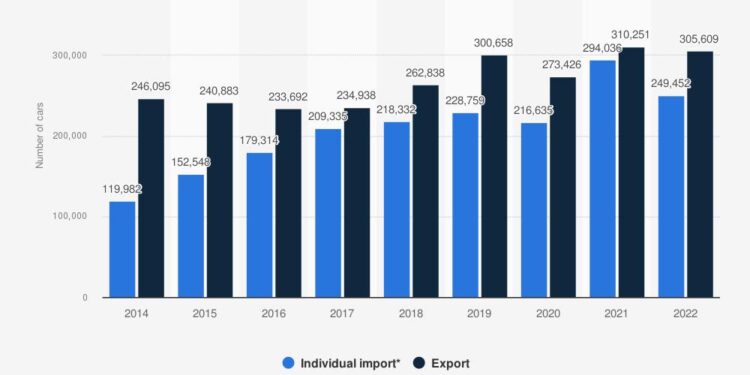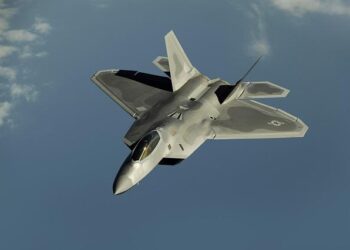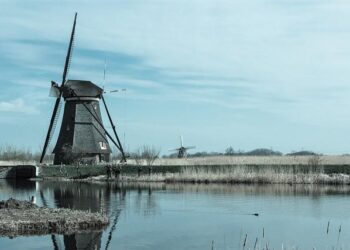Azerbaijan’s bilateral trade with the Netherlands is gaining significant momentum, fueled primarily by a surge in imports from the European country. Recent trade data reveals that Dutch goods are increasingly contributing to Azerbaijan’s economic growth, highlighting the strengthening commercial ties between the two nations. This development underscores the Netherlands’ role as a key partner in Azerbaijan’s efforts to diversify its trade portfolio and boost its market competitiveness.
Imports from Netherlands Boost Azerbaijan’s Trade Volume with Europe
Azerbaijan’s trade landscape with Europe has witnessed a marked expansion, largely driven by a surge in imports from the Netherlands. Over the past fiscal year, Dutch goods ranging from advanced machinery to specialty chemicals have found greater demand across various Azerbaijani industries. This growing commercial engagement highlights the Netherlands’ role as a crucial gateway for European products entering Azerbaijan, further reinforcing bilateral economic ties and diversifying Azerbaijan’s import portfolio.
Key sectors experiencing notable growth include:
- Automotive components – enhancing Azerbaijan’s manufacturing capabilities
- Pharmaceutical products – increasing healthcare accessibility
- High-tech equipment – supporting infrastructure modernization
The following table underscores the latest import figures, emphasizing the Netherlands’ contribution compared to other European partners:
| Country | Import Volume (Million USD) | Growth Rate (%) |
|---|---|---|
| Netherlands | 420 | 18.5 |
| Germany | 380 | 12.3 |
| France | 310 | 9.8 |
Key Sectors Fueling Bilateral Growth and Economic Opportunities
Azerbaijan’s expanding trade relationship with the Netherlands is anchored in several dynamic industries, propelling bilateral economic growth. The energy sector, particularly renewable energy technologies and oil-related equipment, remains a cornerstone of this partnership. Dutch expertise in sustainable energy solutions aligns with Azerbaijan’s strategic ambitions to diversify its energy portfolio beyond traditional hydrocarbons. Alongside energy, the agricultural and food-processing sectors are witnessing robust collaboration, fueled by Dutch innovations in agritech and efficient supply chain management. This synergy is enhancing Azerbaijan’s agricultural output and export potential.
Furthermore, the machinery and chemicals industries play a pivotal role in solidifying commercial ties. The Netherlands supplies high-tech machinery essential for Azerbaijan’s industrial modernization, while chemical products from Dutch manufacturers support various local manufacturing processes. Below is a concise overview of these sectors driving trade between the two countries:
| Sector | Key Dutch Exports | Impact on Azerbaijan | |||||||||||||||||||||
|---|---|---|---|---|---|---|---|---|---|---|---|---|---|---|---|---|---|---|---|---|---|---|---|
| Energy | Renewable tech, oil field machinery | Supports diversification and efficiency | |||||||||||||||||||||
| Agriculture | Agritech, seeds, fertilizers | Boosts productivity and export quality | |||||||||||||||||||||
| Machinery | Industrial equipment and tools | Enhances manufacturing capacity | |||||||||||||||||||||
| Strategic Recommendations to Enhance Azerbaijan-Netherlands Trade Relations To capitalize on the burgeoning trade momentum, it is imperative that both Azerbaijan and the Netherlands intensify their focus on diversifying export portfolios. Azerbaijani policymakers should encourage Dutch companies to invest in key sectors such as renewable energy, agriculture technology, and information services, which align with Azerbaijan’s strategic developmental goals. Simultaneously, enhancing logistics infrastructure and reducing bureaucratic barriers will significantly ease cross-border transactions and foster a more robust trade environment. Collaboration on innovation and sustainability presents a promising avenue for deeper economic ties. Initiatives could include:
|
















